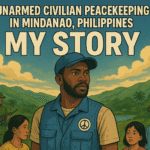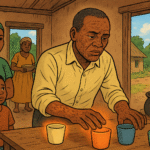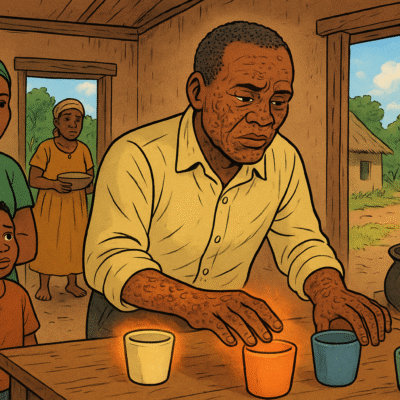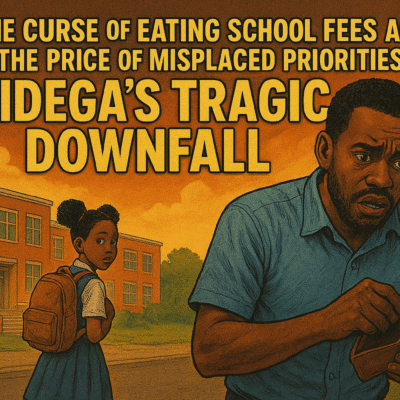Discipline, Childhood and Parenting Lessons from an Acholi Mother in Uganda
Afew nights ago, over dinner with a workmate, we found ourselves lost in a conversation about parenting. We compared the way we raise children today with the way we were raised, and we both agreed that our generation of parents is much softer. We laughed at how we once survived tougher rules, the sticks, and discipline that seemed harsh then, but somehow made us who we are today. The conversation brought back a flood of nostalgic memories of my childhood in Gulu, Uganda, growing up under the watchful eyes of my mother.
She was a single mother, raising four children on a primary school teacher’s salary. At the time, I never understood the weight she carried: Feeding us and paying school fees on one hand, working full-time, doing her lesson plans on the other hand, and still planning for a future. What I knew was that when she raised her voice or her eyes narrowed, you obeyed. And when you disobeyed, the stick reminded you. Her primary weapon was a stick and caning as a form of punishment. And I, being the most stubborn of her children, often felt its sting more than my siblings. I received several strokes for being stubborn, for performing poorly in school, for fighting, and for not doing house chores. But the stick was only one part of her discipline. The other part was her unbending rules, those clear instructions that shaped how we behaved in our home and outside. Those rules, though seemingly harsh, were the foundation of the lessons that shaped the way we moved in the world.
One of those rules was: never eat at anybody’s house other than ours. It didn’t matter if you were hungry, or how sweet the smell from your neighbour’s pot was, or how hastily inviting the aroma was, you were to politely say no. I am not hungry, or I have just eaten. I kept that rule in my head like a commandment. One school holiday, my elder sister and I stayed at our grandmother’s house in Gulu town. One afternoon, we visited our uncle, who lived a few blocks away. My male cousins and I played soccer in the compound while my sister joined her cousins in the kitchen. When the food was ready, everyone sat to eat. But me? I refused. Even when my sister invited me, I shook my head. In my little mind, the rule was clear: never eat at anybody’s house. Relatives or not, my mother had never mentioned exceptions. I waited, hungry and stubborn, holding onto my mother’s words. Later, as we walked back to my grandmother’s house, I told my sister I would report her to my mum for eating. I imagined the joy of watching her being caned for disobeying mother’s rule. But when we returned home weeks later and I proudly reported her, both my sister and my mother laughed. My mother corrected me gently: “Yes, I said don’t eat at anybody’s house, but with relatives, it is different.” I was disappointed. Not only had I starved for nothing, but the punishment I was hoping to see my sister endure never came.
Food itself was a discipline in our home, steeped in the cultural traditions of the Acholi people. Meat or chicken was reserved for Sundays or special days when fortune smiles or a relative visited. We ate from one bowl, and we would all sit around it. But no matter how much meat floated in the soup, no child dared to touch it. First, you ate the soup with posho or millet bread. Only when your mother reached in, tore a piece, and placed it in your hand did you taste meat. The wait was long, but patience was the rule. That training followed me everywhere, and when I visited other homes, my training betrayed me. One day, it hurt me again at my uncle’s house.
Months later, I went to visit my uncle in Lacor, located in the west of present-day Gulu city. It was a dry season, and hunters had returned with anyeri (edible rat), smoked and dried. Anyeri is highly treasured among the Acholi people, cooked with ‘odii’ (homemade peanut butter) until it becomes a delicacy fit for kings and eaten with ‘kwon kal’ (millet bread). That evening under the full moon, we sat outside in the compound, men and boys around one bowl and a heap of kwon kal. Everyone dipped into the soup, picked the meat freely, chewed and enjoyed. Everyone except me. My mother’s lesson held me like a chain: never take meat until it is given to you. So, I ate soup and waited, and waited, until most of the meat was gone. Only then did my uncle notice. “Ouma, have you eaten meat?” he asked. My answer was a weak “no”, and with it came tears. The men roared with laughter, and I was hurting inside, feeling humiliated. That night, I went to bed with a heavy heart and my faith in my mother’s lesson fading. I started to see that sometimes the lessons of home do not fit in the world outside.
But my mother’s discipline was not only in food or caning. Sometimes it came in her words that were warnings wrapped in disguise. If she was leaving home to go somewhere and clothes were drying on the line, she would say, “Let me come back and find rain has beaten these clothes.” Or if grains or beans were drying in the sun, she would say, “Let me return and find them soaked.” Or if food was cooking on fire, she would tell my sisters, “Let the food on fire get burned.” She never told us directly what to do, but we knew what would happen if her words became true. And there was her look, that silent language of African mothers. When visitors came and we crowded the living room with our dirty faces, she would throw us one sharp look. No words. But we knew we must disappear, go outside, and let the elders have their peace.
Now that I am older, I see what I could not see then. My mother’s methods were not gentle, not soft, but were created in the fire of survival. She raised us with discipline, toughness, and faith that it would carry us further than softness ever could. And it did. The sticks taught me boundaries. The rules taught me patience, her eyes taught me respect. But her lessons also left me with questions as a parent. I learned that discipline without explanation can injure. That rules without context can leave a child hungry. That silence can command respect, but also fear.
Today, as I raise my own children, I often ask myself: how do I take the strength of my mother’s discipline and weave it with the gentleness this new world requires? How do I teach patience without making hunger the teacher? How do I teach respect for elders without silencing the voice of a child? Perhaps that is the mystery of parenting. My mother did what she could with the tools she had, and I must do the same in my time. Parenting will never be perfect. It is always a balancing act between discipline and love, between silence and speech, between humility and courage. My mother’s way was not easy, but it shaped me. And in my own way, I am still learning how to pass on the same strength but with less hunger.








